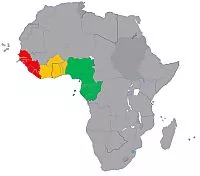Nigeria's general elections are now four months away and campaigns are ongoing. The ethnicity and religion of the candidates for the two main political parties have been the most prominent subjects in this election cycle as we previously forecast. Meanwhile, in the background, the economic environment remains challenging.
Consumer price inflation rose to 20.9% in September while continued contraction in the oil sector has slowed GDP growth to 3.5% in Q2 from 5% a year ago. The naira has depreciated by 6% at the CBN's official exchange rate since March this year, but the parallel rate has been more volatile. And CBN governor Godwin Emefiele triggered further depreciation in the parallel rate last month when he abruptly announced that some banknotes will be changed in December.
Against this backdrop, leading presidential candidates from the ruling All Progressives Congress (APC) and opposition People's Democratic Party (PDP) have laid out the below key economic proposals.
Bola Tinubu, All Progressives Congress
Tinubu wants to 'legislatively suspend the limits on government spending' to fund a large infrastructure and jobs programme. This 'fiscal latitude' that the former governor of Lagos state emphasises in his manifesto1 already typifies policymaking by the current government. As oil revenue has dwindled due to theft and output cuts, the federal government has heavily turned to the central bank to plug the widening budget deficits.
The outstanding balance from the central bank's Ways and Means financing to the government was about NGN550 billion before President Muhammadu Buhari came to power in 2015.2 That has now increased 36-fold in violation of the Central Bank of Nigeria (CBN) Act.3 The proposed 2023 national budget deficit alone is also more than twice the size of the entire 2015 budget – breaching the Fiscal Responsibility Act.4
Tinubu shares Buhari's agrarian vision for the economy where the people grow what they eat. The ruling party candidate's repeated reference to staple crops in his native Yoruba as substitutes for imported food has become an internet meme, but the underlying import substitution policy is a fixture that successive governments have applied across sectors from cement to milk. Tinubu proposes to continue this application through import controls similar to those already in force since 2015. In 2019, the bank blocked milk imports and then exempted six companies on the condition of backward integration after Buhari ordered the central bank to further restrict food imports.
The CBN continues to draw inspiration from Buhari in other areas including exchange rate management. The bank governor Emefiele reorganised the exchange rate regime5 in deference to the president who is averse to devaluation, but this has not helped to stabilise the naira and the most widely-used market rate remains volatile. Tinubu acknowledges in his manifesto that this system is ineffective but only promises to 'review and better optimise' it.
Nigeria's longtime petrol subsidies have cushioned the inflationary impact of war abroad this year – but at an unsustainable fiscal cost. See: West Africa's fuel price reality. From 57% in 2016, the budget deficit to revenue ratio is projected to be above 100% in 2023 with limited petrodollar inflows diverted to subsidies – and with no space for capital expenditure.6 An attempt to end this subsidy programme in 2012 led to an uprising, but the government is now approaching a point where it will be unable to keep subsidising petrol. An end to the programme, which Tinubu has promised, is now seen as a fiscal imperative.
Atiku Abubakar, People's Democratic Party
Atiku has based his governance agenda on increasing the private sector's role in the economy and minimizing the interventionism favoured by the incumbent. He headed a government programme to privatise key sectors such as telecommunications when he was vice president between 1999 and 2007. This currently is in contrast with the statist plan of his main opponent, Tinubu.
While Tinubu promises his administration will employ millions of Nigerians to build transport infrastructure, Atiku envisages private capital will pay for his proposed infrastructural development provided there will be incentives and legislative reform. For example, the Nigerian Railway Corporation has been a monopoly since inception and the rail sector is governed by colonial-era law. In 2016, the Senate passed new legislation to modernise the industry and lay the tracks for private companies to build and operate railways. The legislative process was not concluded.
Atiku and Tinubu agree the present exchange rate system has allowed arbitrage to flourish and harmed the economy. But Atiku has gone further by promising to cancel the multiple rates, and he will be able to achieve this with the CBN governor's cooperation. Emefiele is the first CBN governor to hold the post for more than five years since the country returned to civilian rule in 1999. He survived a 2015 government transition and was reappointed for a second term in 2019 notably by being more malleable than his predecessors.
However, no matter how malleable the CBN governor is, the bank's capacity to shore up the naira is very limited at the moment because oil remains Nigeria's main source of foreign exchange and oil output has halved since 2015 due to theft and other adverse host community factors. International reserves have also reduced by 8% this year7. Our view is that the industry law enacted last year is not enough to reverse this decline in the medium term (See: What's the outlook for Nigeria with newly enacted petroleum law?)
Footnotes
1. Renewed Hope 2023 (2022). All Progressives Congress.
2. CBN statistical bulletin (2015). Central Bank of Nigeria.
3. How CBN violates own law to finance FG (2022). BusinessDay.
4. Again, Nigeria's borrowing plan breaches fiscal responsibility mark
5. The creation of the Nigerian Autonomous Foreign Exchange Market (NAFEX) in 2017
6. 2023-2025 MTEF (2022). Nigeria Budget Office.
7. Gross international reserves have fell from USD40.5 billion on 4 January 2022 to USD37.2 billion on 9 November 2022.
The content of this article is intended to provide a general guide to the subject matter. Specialist advice should be sought about your specific circumstances.


